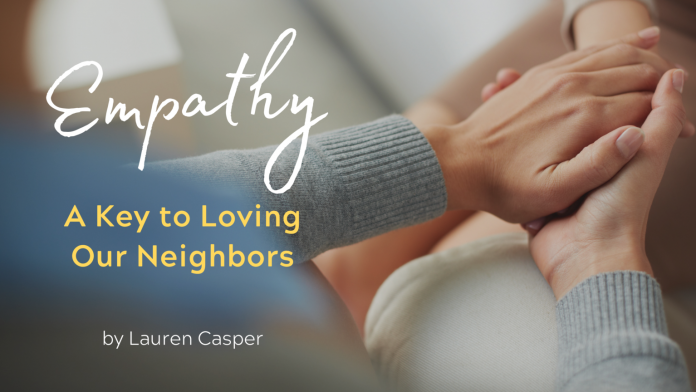“Learn to relate to others through My Love rather than yours…
Instead of trying harder to help people through your own paltry supplies,
become aware of My unlimited supply, which is accessible to you continually.
Let My Love envelop your outreach to other people.”Jesus Calling, May 12
Early in our marriage, my husband and I experienced two miscarriages a year apart, followed by years of infertility. It remains one of the hardest seasons of my life. Even though I had good friends, a loving family, and a supportive faith community, I felt alone in my grief.
Well-intended Words
The platitudes started within days of my first miscarriage. An older woman came to visit and casually mentioned her own miscarriage. “It was early, first trimester,” she said. “I was fine. You’ll be fine too.” Years had taken the edge off her pain and made her forget how it felt to have a freshly broken heart. Her comments were made in a cheery tone that made me feel small and stupid for being so sad
In the weeks that followed, I read handwritten notes in greeting cards, telling me to keep my chin up and “It’ll happen when the time is right.” Friends reassured me I would get pregnant again with a pat on the hand. It felt like everyone wanted to change the subject or make me forget that I had miscarried. They wanted me to be happy—to stop hurting. I truly believe their words and actions were well-intentioned and meant to be loving. But I didn’t feel loved. I felt dismissed.
There was one critical thing missing from my loved ones’ attempts to help when I was hurting—empathy.
Empathy: to see another’s pain, understand the cause, and then feel with them.
My friends wanted to alleviate my pain by ignoring it, reassuring it, or explaining it away. But pain like mine wasn’t from a cavity in need of filling—it was from a broken heart, aching to be seen and validated. I wanted my friends to join me and hurt with me. And, thankfully, a few did just that.
The Myth of Empathy
The myth of empathy is that it requires shared experience. And while it takes more work to empathize with journeys different from our own, it isn’t impossible. It simply requires an effort and a real desire to learn. We may have to look more carefully, expand our worldview, open our ears and homes and hearts, but we can empathize with someone else, regardless of our differences. We can choose to set aside our fears, judgements, and stereotypes.
When Jesus responds to a young lawyer asking who qualifies as his neighbor, He also gives us a beautiful picture of empathy guiding neighbor-love. As the story goes in Luke 10, a Jewish man is traveling by foot from Jerusalem to Jericho when he falls victim to a brutal mugging. He is robbed, stripped, and beaten within an inch of his life before being left to die on the side of the road. A traveling priest notices the wounded man, but quickly moves to the other side of the road to pass by. A Levite approaches, sees the bloodied body, and also hurries by. Then a Samaritan happens upon the scene and the narrative shifts. And while Jews and Samaritans had been mortal enemies for generations, the Samaritan puts the history of animosity aside. His heart goes out to the man in the gutter, and he is filled with compassion. He is led by empathy.
Empathy allows the Samaritan to love the man in the gutter by:
- Seeing the man in his pain.
- Understanding the cause of the pain.
- Choosing to get involved, despite the effort required.
The Samaritan carefully lifts the man onto his own animal and takes him to an inn, where he continues to nurse the man back to health. When the Samaritan leaves, he pays the innkeeper to continue caring for the man until he can return and finish caring for the injured man himself.
Empathy in Action
Seeing, understanding, and choosing to get involved led the Samaritan in a beautiful example of loving another in tangible, life-changing ways. We can love like that if we let empathy guide our way.
Instead of closing ourselves off, we can dive head-first into the mess, wrap our arms around each other, and climb out together.
- When everyone else is shouting, we can seek understanding.
- When we don’t understand someone else’s perspective, we can identify our blind spots and ask questions.
- We can approach life with humility and courage, leaning into our discomfort and big feelings instead of denying them.
Empathy—that’s the often over-looked key to it all. As we get to know each other, see one another, and hear one another, we will know how to love better one person at a time.







